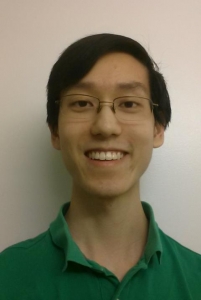David J. Wu

David Jian Wu,
an American computer scientist and computer games researcher and programmer, who balances a mixture of software development and research within the financial industry [2].
He defended his B.Sc. degree in 2011 at Harvard College, Harvard University, delivering the thesis Move Ranking and Evaluation in the Game of Arimaa [3].
David J. Wu is author of the Arimaa bot Sharp, and inspired by AlphaZero, the Go playing program KataGo [4] [5].
Sharp
The Arimaa playing bot Sharp won the 2015 Arimaa Challenge and the then $12,000 USD prize by defeating each of three top-ranked human players in a three game series [6]. It already played the 2008 Arimaa computer tournament, and became runner-up behind David Fotland’s program Bomb, and further won the 2011 and 2014 tournaments but not the contest against the best human players of that time [7]. Sharp's design was elaborated by its author in the 2015 ICGA Journal, Vol. 38, No. 1 [8]. It follows the same fundamental design as strong Chess programs, using an iterative deepening depth limited alpha-beta search and various enhancements within a parallel search algorithm conceptually similar to the dynamic tree splitting described by Robert Hyatt in 1994 [9]. Sharp further implements several Arimaa-specific search enhancements with four steps per move, such as static goal detection and capture generation, and continues to use and benefit greatly from a move ordering function developed in 2011 as described in Wu's thesis - the move ordering function is the result of training a slightly generalized Bradley-Terry model over thousands of expert Arimaa games to learn to predict expert player's moves, using the same optimization procedure described by Rémi Coulom for computer Go [10].
KataGo
KataGo is a Go playing entity inspired by the AlphaZero approach of combining Deep learning with Monte-Carlo Tree Search (MCTS) using pure reinforcement learning aka self play to train the deep neural network. Due to modifications and enhancements of the AlphaZero-like training process, self-play with a only few strong GPUs of between one and several days is sufficient to reach somewhere in the range of strong-kyu up to mid-dan strength on the full 19x19 board [11].
Selected Publications
- David J. Wu (2011). Move Ranking and Evaluation in the Game of Arimaa. B.Sc. thesis, Harvard College, Cambridge, Massachusetts, pdf
- David J. Wu (2015). Designing a Winning Arimaa Program. ICGA Journal, Vol. 38, No. 1, pdf [13]
- David J. Wu (2019). Accelerating Self-Play Learning in Go. arXiv:1902.10565 [14]
Postings
- Neural nets for Go - chain pooling? by David Wu, Computer Go Archive, August 18, 2017
External Links
- lightvector · GitHub
- Arimaa: Game Over? by Andy Lewis, Kingpin Chess Magazine, July 11, 2015
- Arimaa - David J. Wu - Google Play
References
- ↑ Image from Arimaa: Game Over? by Andy Lewis, Kingpin Chess Magazine, July 11, 2015
- ↑ Arimaa: Game Over? by Andy Lewis, Kingpin Chess Magazine, July 11, 2015
- ↑ David J. Wu (2011). Move Ranking and Evaluation in the Game of Arimaa. B.Sc. thesis, Harvard College, Cambridge, Massachusetts, pdf
- ↑ GitHub - lightvector/KataGo: GTP engine and self-play learning in Go
- ↑ KataGo by Warren D. Smith, LCZero Forum, March 16, 2021
- ↑ The 2015 Arimaa Challenge
- ↑ Omar Syed (2015). The Arimaa Challenge: From Inception to Completion. ICGA Journal, Vol. 38, No. 1
- ↑ David J. Wu (2015). Designing a Winning Arimaa Program. ICGA Journal, Vol. 38, No. 1
- ↑ Robert Hyatt (1994). The DTS high-performance parallel tree search algorithm
- ↑ Rémi Coulom (2007). Computing Elo Ratings of Move Patterns in the Game of Go. ICGA Journal, Vol. 30, No. 4, CGW 2007, pdf
- ↑ KataGo/README.md at master · lightvector/KataGo · GitHub
- ↑ dblp: David J. Wu, including another David J. Wu (Cryptography, Computer security)
- ↑ Paper describing "Sharp" the program that won the Arimaa Challenge by ddyer, Game-AI Forum, January 14, 2016
- ↑ Re: catastrophic forgetting by Daniel Shawul, CCC, May 10, 2019